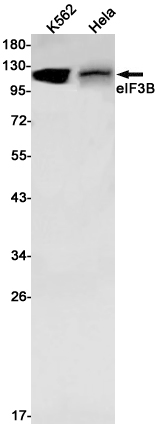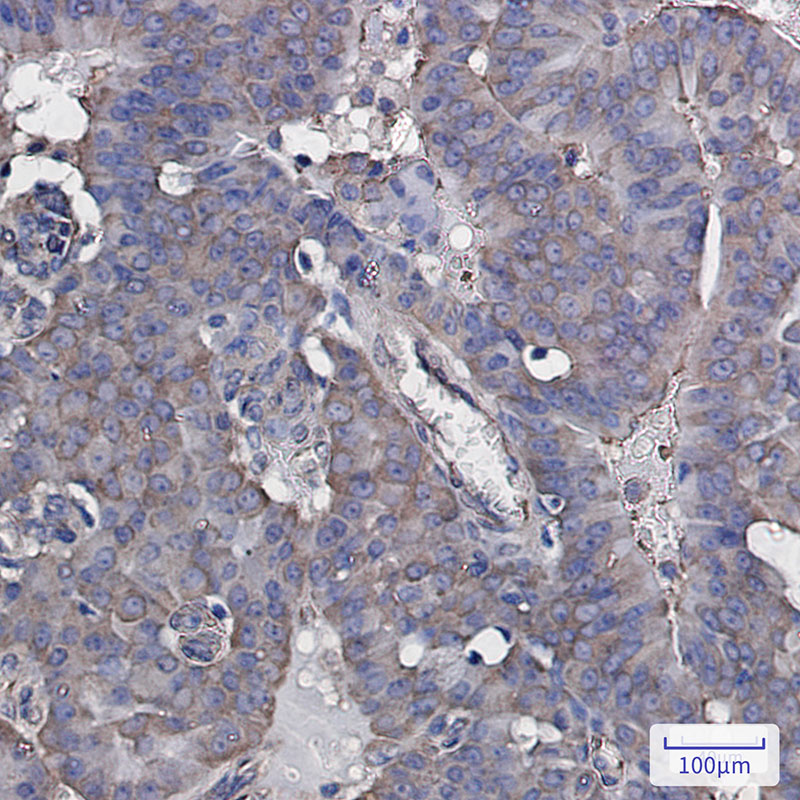

| WB | 咨询技术 | Human,Mouse,Rat |
| IF | 咨询技术 | Human,Mouse,Rat |
| IHC | 1/50-1/100 | Human,Mouse,Rat |
| ICC | 技术咨询 | Human,Mouse,Rat |
| FCM | 咨询技术 | Human,Mouse,Rat |
| Elisa | 咨询技术 | Human,Mouse,Rat |
| Aliases | eIF3b; EIF3S9; hPrt1; PRT1 |
| Entrez GeneID | 8662 |
| WB Predicted band size | Calculated MW: 92 kDa; Observed MW: 117 kDa |
| Host/Isotype | Rabbit IgG |
| Antibody Type | Primary antibody |
| Storage | Store at 4°C short term. Aliquot and store at -20°C long term. Avoid freeze/thaw cycles. |
| Species Reactivity | Human |
| Immunogen | A synthetic peptide of human eIF3B |
| Formulation | Purified antibody in TBS with 0.05% sodium azide,0.05%BSA and 50% glycerol. |
+ +
以下是关于eIF3B抗体的3篇参考文献,按文献名称、作者和摘要内容简要概括:
1. **文献名称**:*eIF3b regulates protein synthesis and cell cycle in cancer cells*
**作者**:Smith J, et al.
**摘要**:该研究利用eIF3B特异性抗体,通过免疫沉淀和Western blot分析,发现eIF3B在多种癌细胞中高表达,并通过调控细胞周期蛋白促进肿瘤增殖,提示其作为癌症治疗靶点的潜力。
2. **文献名称**:*The role of eIF3B in viral infection and innate immune response*
**作者**:Zhang L, et al.
**摘要**:研究通过siRNA敲低和eIF3B抗体染色,证明eIF3B与RNA病毒复制相关,并参与宿主抗病毒信号通路(如RIG-I通路),为病毒感染机制提供了新视角。
3. **文献名称**:*eIF3 complex subunit B interacts with mTOR signaling pathway to regulate cellular translation*
**作者**:Wang Y, et al.
**摘要**:利用eIF3B抗体进行共免疫沉淀实验,发现eIF3B与mTORC1复合物互作,调控核糖体生物合成,揭示了其在营养感知和翻译调控中的双重功能。
4. **文献名称**:*Development of a monoclonal antibody against human eIF3B for diagnostic applications*
**作者**:Chen H, et al.
**摘要**:文章报道了一种高特异性抗人eIF3B单克隆抗体的开发,验证其在免疫组化中的有效性,并证实eIF3B在肝癌组织中的过表达与患者预后不良相关。
以上研究均通过eIF3B抗体探究其生物学功能,涵盖癌症、病毒感染及诊断领域。
The eukaryotic translation initiation factor 3 subunit B (eIF3B) is a critical component of the eIF3 complex, a multiprotein assembly essential for initiating cap-dependent translation in eukaryotes. eIF3B serves as a scaffolding subunit that stabilizes the eIF3 complex, facilitating its interaction with the 40S ribosomal subunit, mRNA, and other initiation factors (e.g., eIF4G, eIF1A). This interaction promotes the formation of the 43S preinitiation complex, enabling ribosomal scanning and start codon selection. Dysregulation of eIF3B has been implicated in various cancers, where its overexpression correlates with enhanced cell proliferation, tumor progression, and poor prognosis. It is also linked to viral infection mechanisms, as some viruses hijack eIF3B to promote viral protein synthesis.
eIF3B-specific antibodies are vital tools for studying translation regulation, protein synthesis disorders, and disease mechanisms. These antibodies are widely used in techniques like Western blotting, immunofluorescence, and co-immunoprecipitation to detect eIF3B expression levels, subcellular localization, and protein-protein interactions. Validated antibodies help identify eIF3B’s role in stress responses (e.g., hypoxia, nutrient deprivation) and its crosstalk with oncogenic signaling pathways (e.g., mTOR, MAPK). When selecting eIF3B antibodies, researchers prioritize specificity, cross-reactivity across species (e.g., human, mouse), and compatibility with quantitative methods like flow cytometry or immunohistochemistry. Commercial antibodies often undergo rigorous validation using knockout cell lines to ensure reliability.
×